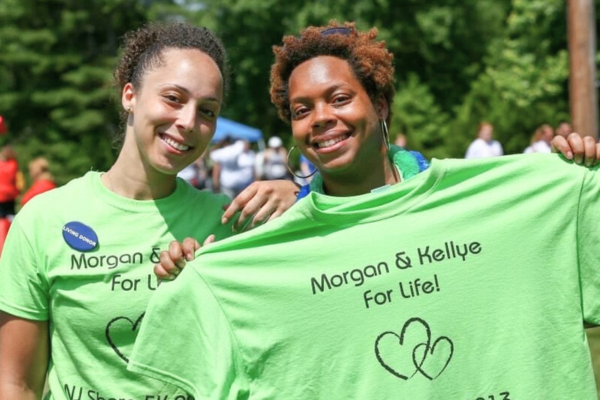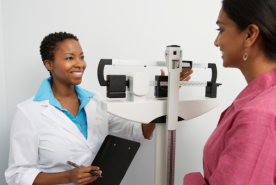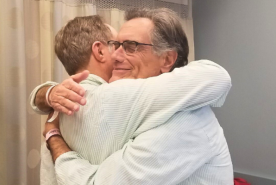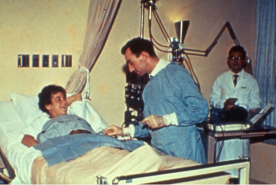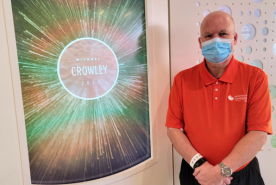February 14, 2023
Sixteen years ago, a college friend transformed Morgan Reid's life by donating a kidney to her. This life-changing gift freed Morgan from dialysis and greatly improved her quality of life. Driven by gratitude, Morgan has since dedicated her life to ensuring everyone gets the same chance by advocating for life-saving transplants for all.
Morgan’s IgA nephropathy diagnosis and kidney failure
When she was eighteen, Morgan's recurring migraines were the first signs that something was amiss with her health. After some nudging from family, she went to the doctor to get it checked out.
"My creatinine came back slightly elevated at 1.4. My primary care physician thought my lab work may have gotten mixed up and ordered more but they came back the same," Morgan said. "I went through an ultrasound and then ultimately a biopsy and found out I had IgA nephropathy and my migraines stemmed from high, uncontrolled blood pressure."
Morgan was prescribed medicine and sent on her way. For the next three years, she lived like many other young adults–she went to school, held down a job, and had fun with friends. At 21, she was taken off her parents' health insurance and lost prescription coverage.
"I wasn't taking my medication anymore. I assumed it would be fine, as long as I didn't eat salty foods," said Morgan. "I didn't receive education about my chronic kidney disease, the medication, or how to slow the progression through diet and exercise. Maybe I would have taken the medication component more seriously if I had."
Unaware of her quickly progressing kidney disease, Morgan visited her aunt in another state. They were out shopping when Morgan started feeling strange.
"My aunt took me to a grocery store to use the blood pressure cuff. It was 228 over 160," Morgan said. "I called my mom, who is a nurse. She immediately panicked since it was dangerously high."
Her aunt rushed Morgan to the hospital, where she found out she had kidney failure and needed to start dialysis immediately. Her creatinine level was 18, she had brain swelling, and was beginning to go blind. The doctors couldn't understand how she was even standing.
"I was admitted to the ICU where they stabilized me. I flew back to New Jersey and went right to my nephrologist who sent me right to the hospital so that I could get my catheter to start dialysis," Morgan said. "I was so full of toxins that I would sleep for up to fourteen hours at a time but once I started peritoneal dialysis, I started to feel better. I enrolled back at school where I met my friend Kellye Miller, who would ultimately save my life with a kidney transplant."
Are you at risk of kidney disease? Take this one-minute quiz to determine your risk. Then, ask your healthcare professional about these two simple tests to check your kidney function.
Receiving a kidney transplant
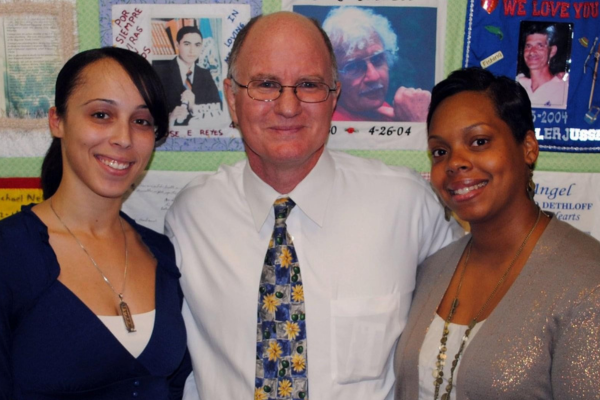
As an outgoing young adult, Morgan never met a stranger she couldn't befriend.
"I'm gregarious by nature–I talk to everybody," said Morgan. "One day I went up to Kellye and said, 'We're in the same class in the morning and afternoon. You're walking around campus, and so am I. We should hang out.' That's how we became friends."
Kellye and Morgan would hang out on campus all day before the friend group ventured into New York City to dance and have fun. They always invited Morgan, but she needed to be home at night for peritoneal dialysis.
"I never shared with my college peers or my friends that I needed a transplant or that I was on dialysis because I didn't want anyone feeling sorry for me or treating me any differently," Morgan said. "One day Kellye insisted on knowing why and I finally shared that I was on dialysis and needed a kidney transplant. Two weeks later, she came to me and offered to give me one of her kidneys."
At first, Morgan turned the offer down since she couldn't wrap her mind around accepting such a generous gift without repaying it. But, six months later, Morgan's health began declining, and Kellye volunteered her kidney again.
"I assumed that was God giving me one more lifeline, so I gave her the name and number of my transplant coordinator," said Morgan. "Kellye went through all of the testing and I will never forget the day I got the call that she was a match."
Morgan's transplant took place January 9th, 2007: "It's been 16 years and I'm full of life. That is what drives me in the work that I do every day at the National Kidney Foundation as the Transplant Policy and Strategy Director. It truly is the greatest honor and privilege to give back and advocate for kidney patients like myself. I'll do anything that I can to help other people receive the gift of life that I have. It's all coming from my heart and my kidney."
Working to ensure everyone gets a transplant
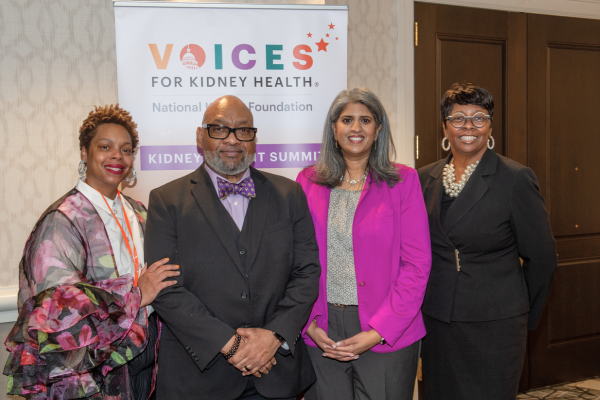
Many environmental, medical, and social factors could increase the risk of kidney disease and act as barriers to obtaining a kidney transplant.
"Inequities exist at every phase of the kidney care continuum. Poorer communities, communities of color, and rural communities often face a delayed diagnosis of kidney disease and have a deficiency in slowing the progression of kidney disease," Morgan said. "Transportation, child and elder care, and a person's social determinants of health, such as education and health literacy, could delay referral and evaluation for transplantation."
NKF has worked to increase equitable transplant care by helping pass The Living Donor Protection Act in multiple states and eliminating the race-based eGFR equation nationwide.
"There were two equations that were used, one of them included a race-based coefficient. If you are Black, the calculation often resulted in a person's kidney function not being as bad as it was, meaning a person would receive a delayed referral for transplantation," said Morgan. "Removing that race-based coefficient levels the playing field. The OPTN, the Organ Procurement and Transplantation Network, has unanimously agreed to restore or modify wait time for those black patients that were evaluated using the hopefully soon-to-be obsolete race-based eGFR calculation."
The team is now drafting The Organ Transplantation Transparency, Accessibility, and Reform Act (OTTAR) to provide grants to patients needing funding and create better data transparency.
"An estimated 37 million people are living with chronic kidney disease and thousands living with end-stage kidney disease on dialysis. There are 90,000 plus people on the kidney transplant waitlist. We want to make sure that people are getting transplanted," Morgan said. "We believe that everyone, regardless of race, socioeconomic status, social determinants of health, and gender deserve access to transplants."
Want to help Morgan achieve transplants for all? Become a Voices for Kidney Health Advocate. Your voice and support make all the difference.
